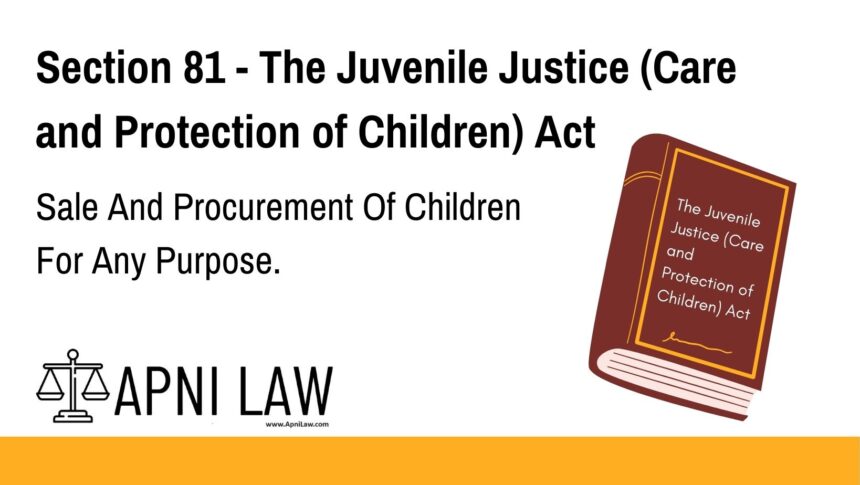Code: Section 81 of the Juvenile Justice Act
81.
Sale and procurement of children for any purpose.
Any person who sells or buys a child for any purpose shall be punishable with rigorous imprisonment for a term which may extend to five years and shall also be liable to a fine of one lakh rupees.
Provided that where such offence is committed by a person having actual charge of the child, including employees of a hospital, nursing home, or maternity home, the term of imprisonment shall not be less than three years and may extend up to seven years.
Explanation of Section 81
Section 81 of The Juvenile Justice (Care and Protection of Children) Act addresses the grave issue of child trafficking, prohibiting the sale and procurement of children for any purpose. The section makes it clear that selling or purchasing a child is a serious offence and provides strict punishments for those found guilty of this crime.
The penalties for this crime are as follows:
- Imprisonment: A term of up to five years with rigorous imprisonment.
- Fine: A fine of up to one lakh rupees.
An even more severe punishment is prescribed for individuals who are in charge of the child, such as employees of a hospital, nursing home, or maternity home, or others with actual custody of the child. In such cases, the minimum prison term is three years, which can extend to seven years.
Illustration
Example 1: Selling a Child
A person sells a child to another individual for exploitation or illegal purposes. The offender can be sentenced to up to five years of rigorous imprisonment and a fine of one lakh rupees.
Example 2: Hospital Employee Selling a Child
An employee of a hospital illegally sells a newborn child. Due to the individual’s responsibility for the child’s care, they will face three to seven years of imprisonment, in addition to a fine.
Common Questions and Answers on Section 81
1. What is the punishment for selling or buying a child under Section 81?
- Answer: The offender can face up to five years of rigorous imprisonment, along with a fine of one lakh rupees.
2. Are there increased penalties if the offender has charge over the child?
- Answer: Yes. If the person committing the offence has actual charge of the child (such as an employee in a hospital), the prison term ranges from three to seven years.
3. What types of individuals are held accountable under this section?
- Answer: Any person involved in selling or buying a child, including those in charge of the child’s care like hospital or maternity home employees, are liable under this section.
Conclusion
Section 81 of The Juvenile Justice (Care and Protection of Children) Act serves as a strong deterrent against the sale and procurement of children for any purpose. It provides significant penalties for offenders, especially those in trusted roles who exploit their responsibility over children. The section highlights the importance of safeguarding children’s rights and preventing trafficking.








